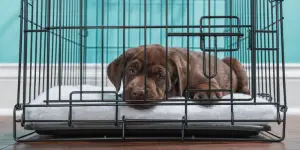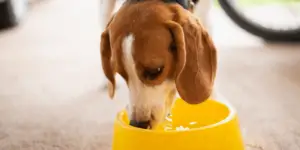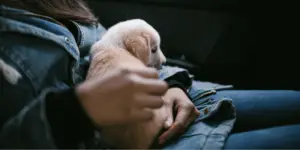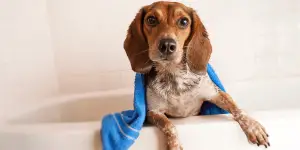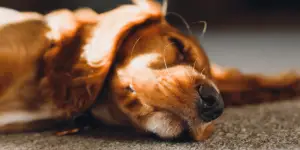
Puppy development stages – Everything you need to know
- Written by Dr Linda Simon
- Last updated
In this article
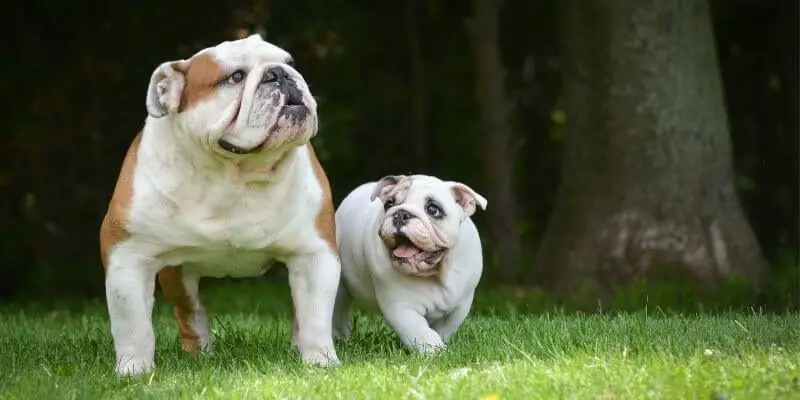
Puppy development stages – Everything you need to know
Knowing what your puppy should be doing and when is important, so we can ensure they are right on track. If you are concerned your pup is not meeting their milestones as they should, have a chat with your vet. Read on to learn all about those first important months of your dog’s life.
6 weeks
At 6 weeks, puppies should be with their mum and siblings. They will still be nursing, which is important for their immunity and to protect them from the infectious diseases they are not yet vaccinated against. As well as this, they will be eating good quantities of puppy food and drinking water.
At this age, the puppy’s ability to learn and be trained is very limited. Instead of trying to house train them, focus on spending good quality time with them and on building their confidence and their trust in humans. Mum will be working on teaching the pup some manners at this point!
Now is a critical socialisation period. Where possible, expose your pup to different sights and sounds in the home including the hoover, television, recordings of fireworks, the mailman etc. These should be pleasant experiences that do not worry the pup. Importantly, this is about the age a pup can become fearful, so we need to work with them to ensure we are going at their pace and they are not feeling overwhelmed.
7 weeks
By 7 weeks, your puppy should have really started to come out of their shell. They will be more active and playful than ever before. You may notice a good deal of play fighting among siblings and they will also be interacting much more with the breeder and anyone else who is in the home.
Now can be a good time to start crate training, if this is something the owner wishes to pursue. The crate is not a place for the dog to go when punished, rather it is a safe sanctuary for them to relax. At 7 weeks, your pup may want a little ‘alone time’ and they may actively choose to go into their crate. This can be encouraged and rewarded. Take a look here, to learn more about your pup and crate training.
Puppies at this stage are becoming curious and nosy. They will be getting into everything and it is vital that they house is completely puppy proof. Not only this, we need to keep a closer eye than ever before, now that the pups are getting bigger and stronger. You’ll realise they can suddenly do (mischievous!) things that they couldn’t do just last week.
8 weeks
For many puppies, 8 weeks is one of the most important times of their lives as they are going to their new forever home. This is a huge step for them, and we need to try and support them and make the transition as smooth as possible.
8 weeks is also usually the time of the first vet check. During this check, your puppy will be examined and may also be having their first vaccine and microchip. They should be weighed and any health issues (like an umbilical hernia, heart murmur or retained testicle) will be flagged.
As your puppy is dealing with a lot this week, offer your support and patience. Many will feel overwhelmed and by giving them the tools they need to cope; we are setting them up for success. Try to ensure their new home is calm and quiet and gradually introduce them to home life. Limit visitors to the home and delay introductions to other pets until the pup has had more time to settle in.
Remember, your little fluffball is still in their critical socialization period so we should aim to ensure all encounters with people and animals are positive and on your pup’s terms. The more great experiences they have, the more they will learn to trust the world around them. This goes a huge way to preventing anxiety and behavioral issues from developing.
9 weeks
Around this age, most pups have started to settle into their new home and are coming out of their shell, with personalities on display and emotions running high. A pup who slept a lot in their first few days at home may now be spending more time chewing your slippers and hoovering crumbs off the floor.
Those wobbly little butts are getting stronger as muscles are developing. Your pup will be able to run faster and jump higher than just a couple of weeks ago. At 9 weeks of age, you’ll find they are changing at lightning speed and growing before your very eyes. This is an important time to take photos and videos; you’ll be grateful for these when your pup has grown into an adult dog.
Puppies will start to form solid bonds with their owners, usually focusing on the person who spends most time with them, plays with them and feeds them. They may already start to show a preference to their owner over a visitor. This is a beautiful time when the human animal bond is growing stronger every day.
10 weeks
A 10-week-old pup is soaking up their surroundings like a little sponge, learning new things every day. We should be working with them, providing mini training sessions every day. They should be rewarded with lots of praise and treats when they get something right, making a positive association with being ‘a good dog!’. If you find their attention span flagging, stop the session, we don’t want to overdo it.
At this age, a pup is well able to learn a simple commands such as ‘sit’ and ‘paw’. Repetition is key so, even after mastering a command, keep at it. It is a great habit to get into, to ask for a command before your dog gets something. For example, asking for a ‘sit’ before your puppy can eat their meal helps them to learn patience and respect.
Many puppies have their second vaccine and vet check at around 10 weeks of age. This can be a worrying experience for them, particularly if they disliked the pinch of their first jab just two weeks prior. Remember to be calm and encouraging, rewarding your pup with high-value treats (like boiled chicken) throughout. Try to show up right on time, avoiding too long in the waiting room; a place your pup may find overwhelming at this stage in their development.
11 weeks
This week, your puppy will be teething in full force. This will likely be bothering you just as much as it bothers them. Those sharp shark teeth can cause mayhem at home and many owners despair at being constantly nipped and charged at. Remember, this is a normal phase and things will improve with time.
As your puppy explores the world with their teeth and burns off their excess energy with you as the main ‘punching bag’, try to remember they are not trying to be obnoxious. It can help if you wear long sleeves and trouser legs. Divert all of that energy to something more productive than nipping on you. At this age, dogs enjoy tug toys, pup safe teething toys and lots of mini training sessions and short walks.
It is not uncommon for puppies to start becoming ‘problematic’ about this age, doing things like chewing on furniture and slippers. It is our responsibility to make sure our home is a safe space and that anything we don’t want to be chewed is moved out of reach when possible.
12 weeks
Your puppy is working on their social skills and starting to understand more about the world around them. It is at this point that you can start to really learn about your pup’s unique personality. Whether they are naturally dominant or fearful, this will start to clearly show at this time. Understanding what type of personality your dog has is critical when it comes to knowing how to train them and how to help them cope with the world around them.
At this point, your pup’s socialization period is ending. Try to make sure you’ve introduced them to as much of the world around them as possible by now. This includes a range of animals (including other dogs, cats and horses) as well as people of all ages. Anything you would encounter when out and about, like traffic and cyclists, should be something you expose your pup to in a calm and measured way.
While 3 months old, your pup is still a ‘baby’ and should still be monitored most of the time. It is best not to leave your puppy alone for much longer than an hour if at all possible
13 weeks
By 13 weeks, your puppy will be at their peak ‘zoomies’ phase. If you’re not sure what ‘zoomies’ are, take a look here. Try your best to tire your pup out during the day, so they can be encouraged to settle in the evening, when you and your family want to relax and unwind after a long day.
While ‘zoomies’ are not harmful to your dog, it can quickly become tiring as your young pup disrupts yet another episode of your favorite show. While some running about is entirely normal, if your puppy is constantly hyper and unable to settle at night, it is possible they are not getting enough mental and physical stimulation during the day.
Though young, most pups this age need a huge amount of interaction in the form of both mental and physical stimulation. If left to their own devices, they quickly become bored and destructive. If this is happening, instead of blaming your young pup, ask yourself what more you can be doing to keep them engaged and entertained.
6 months
When adolescence starts, you can start to notice behavior that is driven by hormones. This includes a male cocking his leg and females experiencing their first heat cycle. Some owners choose to neuter their pup at this age, though many vets are now advising neutering is delayed until the pup is more mature. When to neuter depends on the individual and there is no ‘one size fits all’.
Remember, smaller breeds tend to go through canine puberty sooner than larger breeds, so while most dogs start adolescence from 6 months, this will be later in large and giant breeds.
By 6 months, your dog will be fully house trained. If this is not the case, is it possible you have let things slide? If not, consider that there may be a medical issue and schedule a check-up.
For some dogs, behavioral issues can start to develop at this age. This can include anxiety-driven behavior like resource guarding. Rather than ‘seeing how it goes’ or hoping your pup improves without intervention, it is vital we seek help now. A qualified canine behaviorist can help you work alongside your young puppy to nip any unwanted behaviors in the bud.

Dr Linda Simon
Dr Linda Simon MVB MRCVS is a locum veterinary surgeon who has worked in London for the past 10 years. She graduated top of her class in small animal medicine from UCD, Dublin. She is currently a member of the Royal College of Veterinary Surgeons.

